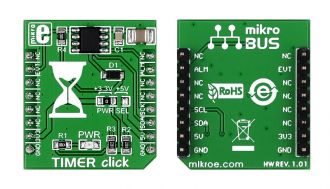
We strongly encourage users to use Package manager for sharing their code on Libstock website, because it boosts your efficiency and leaves the end user with no room for error. [more info]

Rating:
Author: MIKROE
Last Updated: 2019-03-14
Package Version: 1.0.0.1
mikroSDK Library: 1.0.0.0
Category: RTC
Downloaded: 5861 times
Not followed.
License: MIT license
Timer click is a mikroBUS add-on board with Maxim’s DS1682 total elapsed time recorder. It holds an elapsed time counter (ETC) in conjunction with the ALARM pin. The alarm flag is one time programmable. The board communicates through I2C interface, with two additional pins: ALARM and EVENT. It uses either a 3.3V or a 5V power supply only.
Do you want to subscribe in order to receive notifications regarding "Timer click" changes.
Do you want to unsubscribe in order to stop receiving notifications regarding "Timer click" changes.
Do you want to report abuse regarding "Timer click".

Library Description
The library covers all the necessary functions to control Timer Click board. Timer click communicates with the target board via I2C protocol. This library contains drivers to write and reads data from DS1682 total elapsed time recorder, the function for set/gets ETC, EC, alarm seconds, for reading/write EEPROM memory, etc.
Key functions:
Examples description
The application is composed of three sections:
void applicationTask()
{
timer_getTime( &timeDays, &timeHours, &timeMinutes, &timeSeconds );
if ( timeSecondsNew != timeSeconds )
{
mikrobus_logWrite( " ", _LOG_TEXT );
displayLogUart( timeDays );
mikrobus_logWrite( " days ", _LOG_TEXT );
displayLogUart( timeHours );
mikrobus_logWrite( ":", _LOG_TEXT );
displayLogUart( timeMinutes );
mikrobus_logWrite( ":", _LOG_TEXT );
displayLogUart( timeSeconds );
mikrobus_logWrite( "", _LOG_LINE );
mikrobus_logWrite( "------------------", _LOG_LINE );
timeSecondsNew = timeSeconds;
}
Delay_1ms();
}
Additional Functions :
Other mikroE Libraries used in the example:
I2CUART​ConversionAdditional notes and informations
Depending on the development board you are using, you may need USB UART click, USB UART 2 click or RS232 click to connect to your PC, for development systems with no UART to USB interface available on the board. The terminal available in all MikroElektronika compilers, or any other terminal application of your choice, can be used to read the message